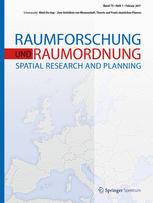
Call for Papers: ARL-Kongress 2019 "Postwachstum und Transformation. Planen – Steuern – Wirtschaften"
Call for Papers: ARL-Kongress 2019
Postwachstum und Transformation. Planen – Steuern – Wirtschaften
27. und 28. Juni 2019 in Kassel
Hintergrund und Themenstellungen
In der politischen und gesellschaftlichen Debatte über die Notwendigkeit einer Transformation zu nachhaltigen Lebens- und Wirtschaftsformen stehen neben dem Klimawandel insbesondere die Endlichkeit natürlicher Ressourcen und der global fortschreitende Ressourcenverbrauch im Mittelpunkt. Zunehmend wird die Sinnhaftigkeit von kontinuierlichem materiellem Wachstum infrage gestellt und es werden Entwicklungsansätze jenseits einer reinen Wachstumsorientierung gesucht. Gemeinwohlorientierung, soziale Inklusion und Umweltverträglichkeit sind die Leitziele einer Debatte, die die gegenwärtig vorherrschenden Wirtschaftsformen und deren negative Auswirkungen kritisch hinterfragen. Dazu gehört auch eine Neubewertung von Begriffen wie Entwicklung, Wohlstand und Wohlergehen.

 Der sich regional sehr unterschiedlich darstellende Strukturwandel der Wirtschafts- und Arbeitswelt, demographische Veränderungen und nicht zuletzt globale Entwicklungen, die dazu führen, dass Menschen aus den verschiedensten Kulturkreisen zu uns flüchten, stellen Städte und Kommunen vor neue Herausforderungen. In den Sozialräumen der Städte und Gemeinden erzeugen diese (die Stadtentwicklung beeinflussenden) gesellschaftlichen Entwicklungen veränderte Ausgangslagen und neue Dynamiken im Hinblick auf vorhandene Chancen sozialer Integration bzw. Gefahren sozialer Desintegration.
Der sich regional sehr unterschiedlich darstellende Strukturwandel der Wirtschafts- und Arbeitswelt, demographische Veränderungen und nicht zuletzt globale Entwicklungen, die dazu führen, dass Menschen aus den verschiedensten Kulturkreisen zu uns flüchten, stellen Städte und Kommunen vor neue Herausforderungen. In den Sozialräumen der Städte und Gemeinden erzeugen diese (die Stadtentwicklung beeinflussenden) gesellschaftlichen Entwicklungen veränderte Ausgangslagen und neue Dynamiken im Hinblick auf vorhandene Chancen sozialer Integration bzw. Gefahren sozialer Desintegration.

